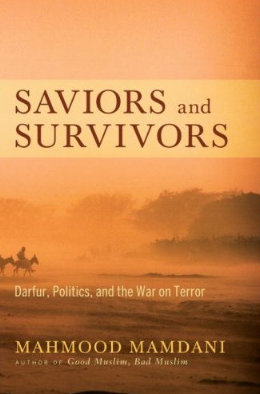300 000 people have been killed and 2.5 million been made refugees in the war in Darfur. In his new book, anthropologist Mahmood Mamdani describes the Save Darfur campaign as representing a refracted version of the moral logic of the “War on Terror” with the Arabs in both cases branded as evil, Alex de Waal writes in The Monthly Review.
Mamdani writes:
The Save Darfur lobby demands, above all else, justice, the right of the international community — really the big powers in the Security Council — to punish “failed” or “rogue” states, even if it be at the cost of more bloodshed and a diminished possibility of reconciliation. More than anything else, “the responsibility to protect” is a right to punish without being held accountable — a clarion call for the recolonization of “failed” states in Africa. In its present form, the call for justice is really a slogan that masks a big power agenda to recolonize Africa.
Mamdani criticizes Save Darfur as mobilizing “child soldiers,” by which he means naive American students, in a campaign that diminishes Africans as part of an argument to “save” them, G. Pascal Zachary notes in his review.
Zachary is one of several scholars who discuss Mamdanis book Saviors and Survivors. Darfur, Politics, and the War on Terror on their group blog Making Sense of Darfur.
Zachary is a huge fan of Mamdani but feels that “like almost everyone else who speaks on Darfur, Mamdani too has another agenda":
Like all those he complains about who use Darfur to score points on matters of greater importance to them – repressive Islamic regimes, Christian tolerance, the value of military intervention, etc – Mamdani too subordinates Darfur to a broader set of stories he wants to tell about dysfunctional American power in the world, about misunderstood Muslims, about an Africa violated by Westerners from every point of the political spectrum. Mamdani may be right about all of these larger stories, but just he is wrong to exploit Darfur – as wrong as those he finds guilty of doing the same.
>> read the whole text “Mamdani and the Uses of Darfur”
>> Saviors and Survivors (Monthly Review 13.4.09)
>> What Does Darfur Have To Do With The “War On Terror”? Kevin Funk, Making Sense of Darfur, 19.4.09)
>> The Darfur the West Isn’t Recognizing as It Moralizes About the Region (New York Times, 30.3.09)
>> Mahmood Mamdani: You (and I) got Darfur Wrong (Radio Open Source 3.4.09)
In an interview with the Boston Globe, the anthropologist explains his interest for the Darfur case:
In a context where African tragedies seem never to be noticed, I wondered why Darfur was an obsession with the global media. The reason, I realized, was that Darfur had become a domestic issue here, thanks to the Save Darfur movement. So I thought it important to examine the movement’s history, organization, and message.
(…)
I’m struck by the contrast between the mobilization around Darfur and the lack of mobilization around Iraq. The explanation, I believe, lies in the fact that Save Darfur presented the conflict as a tragedy, stripped of politics and context. There were simply “African” victims and “Arab” perpetrators motivated by race-intoxicated hatred. Unlike Iraq, about which Americans felt guilty or impotent, Darfur presented an opportunity to feel good.
(…)
The language of human rights was once used primarily by the victims of repression. Now it has become the language of power and of interventionists who turn victims not into agents but into proxies. It has been subverted from a language that empowers victims to a language that serves the designs of an interventionist power on an international scale.
>> read the whole interview
I wrote about Mamdani and Darfur earlier, see Mahmood Mamdani: “Peace cannot be built on humanitarian intervention” and about earlier books Book review: Mahmood Mamdani: “Good Muslim, Bad Muslim”

I thought that this was a great piece by Mamdani as well:
http://www.lrb.co.uk/v29/n05/mamd01_.html
Thanks for posting this.